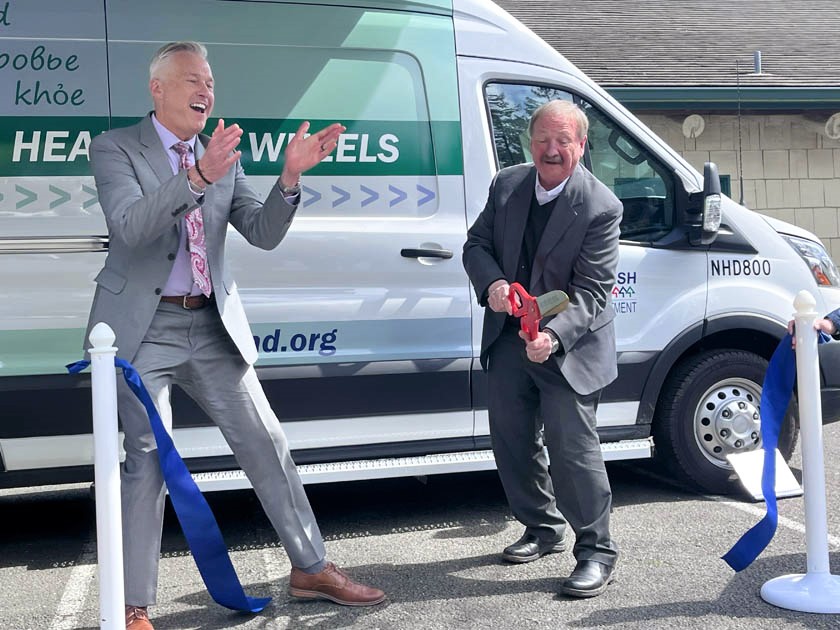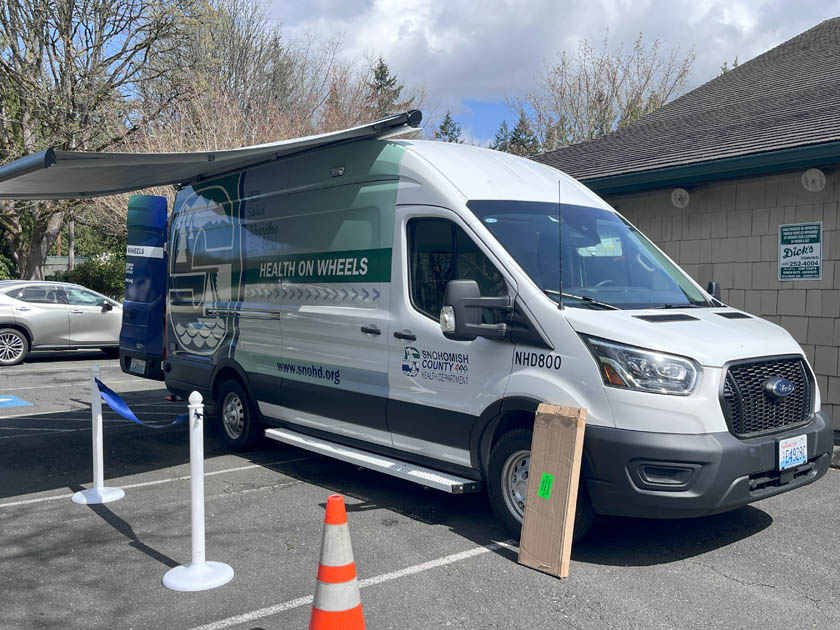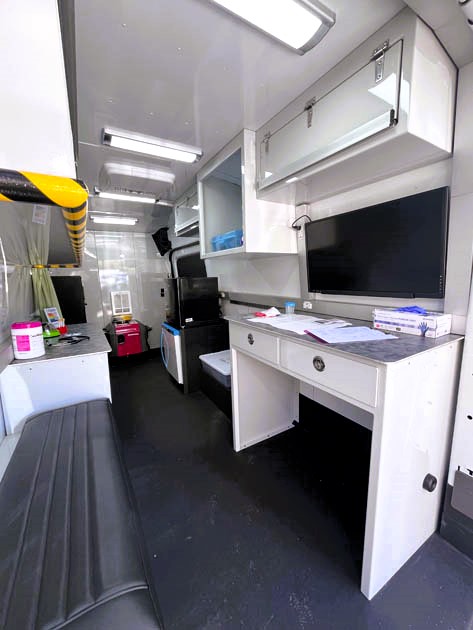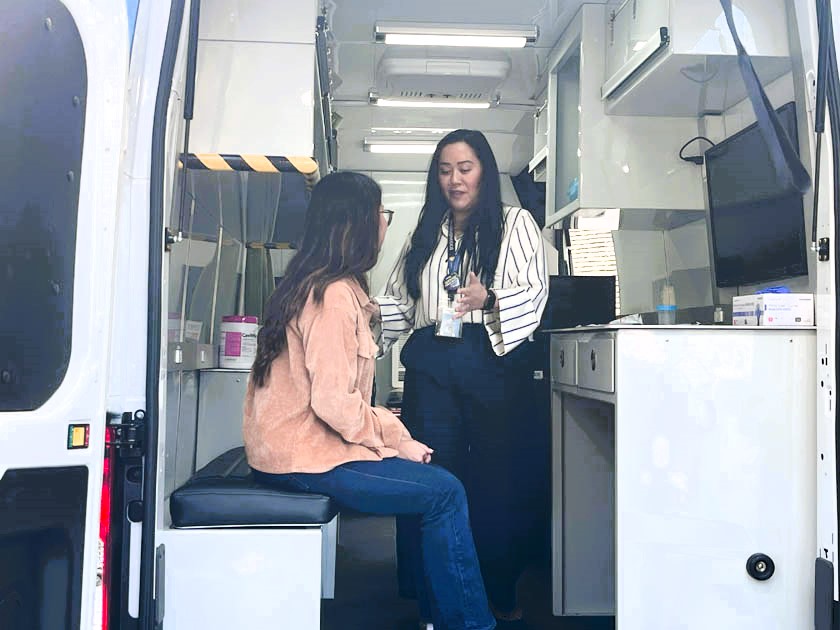EVERETT—The Snohomish County Health Department unveiled its new, state-of-the-art, ‘Health on Wheels’ van today just in time for National Public Health Week which spans from April 7 through 13.

The Health on Wheels van is a mobile public health unit designed to bring essential services directly to residents across Snohomish County, expanding the reach of preventative care and health education—meeting people where they are, especially in underserved communities, the Department said.
The mobile health unit will specialize in immunization and STI treatment initially but may branch out to offer other public health services in the future such as health education, environmental health services, community events, and more, said Dennis Worsham, Snohomish County Health Department Director.
Children will receive immunization treatment at no cost to families and the County is currently holding conversations with local and State partners on grant opportunities that would allow adults to receive the same treatment at little-to-no cost.
The vehicle is equipped with fold-out tables and chairs, benches, cabinets, an operational refrigerator (to store vaccines), a monitor to pull up medical charts, and can be separated into two private rooms via a sliding curtain. The van also has the capacity to set up treatment rooms outside to maximize its effectiveness and patients seen.

The logo was designed by Sacha Coughran, with the Department’s Communications team, and inspired by Pacific Northwest themes, with greens and blues and forward-moving arrows to represent progression. The different languages to the side of the logo represent the van’s approach to multilingual accessibility by representing Snohomish County’s top five spoken languages.
On average the Health on Wheels van can see approximately four patients an hour for STI treatment and evaluation, and up to 25 patients per hour for vaccinations. However, this number could drastically improve with external tents set up out front, Pia Sampaga-Khim, Prevention Services for the Health Department said.
The decision to launch a mobile health van stemmed from the County’s “desire and journey to provide public health services directly to the citizens of Snohomish County,” said Snohomish County Executive Dave Somers Wednesday, who sat on the Health Board and who’s mother worked at a local Health Department growing up.

“This is just part of the innovation that we try to do here in the County. It is an innovation County, we’re 850,000 people with aerospace, biomedical, fusion research, and all kinds of stuff but this is an innovation in the public health sector, and we want to keep going on this,” said Somers. “There’s rocky times ahead but we have to look for ways to strengthen our programs and services and we have to build stronger programs here and keep forward in positive ways.”
The idea for the van spans back two years ago, close to when Health Department Director Worsham was first beginning his position and back when the world was bouncing back from COVID.
Worsham said Wednesday that those conversations related to removing barriers for rural, and underserved, communities who would often have to travel to brick-and-mortal health facilities.
Typically, that role was filled with the Washington State Department of Health-backed Care-a-Van mobile health unit but with recent federal cuts to health services that program has been since been dissolved.

Recent federal actions have resulted in the loss of up to $3.4 million for the Snohomish County Health Department, Kari Bray, County Spokesperson, told the Lynnwood Times. These cuts are to federal grants that passed through the Washington State Department of Health to local health jurisdictions.
The Snohomish County Health Department had allocated these funds primarily for health education and outreach, including efforts to improve access and awareness around immunizations and disease prevention.
“We are still assessing the impacts of this reduction in federal funding, both locally and for statewide public health resources that local departments rely on. Our Health Department leadership and staff remain deeply committed to serving the public and are making strategic decisions and prioritization to minimize impacts of any cuts to services,” said Bray. “However, continued reductions of this magnitude will make it increasingly difficult to shield the public from the consequences. Sustained disinvestment in public health compromises our ability to respond to emerging health threats, maintain essential services, and protect our most vulnerable residents.”
Bray continued that while a federal court has halted the cuts for now, the County faces the same uncertainty as others who are trying to implement programs with uncertain federal funding commitments.
Along the same lines of great timing, but separate to the federal cuts, and falling within National Health Week, also noting that two out-of-three strains of measle diagnoses were just identified in Snohomish County making the van’s immunization efforts much more needed.
“Getting out, getting people immunized, removing those barriers are really important to serving those areas,” said Worsham. “So we’re excited, timing is perfect, we’re moving forward and taking our foot off the break, so to speak, with the van and really stepping forward in our community’s where it’s needed with an innovative approach to meeting them where they’re at.”
The vehicle’s $296,000 price tag was paid for fully with American Rescue Plan Act funds. Now that those funds are nearing their end, the County hopes to partner with State agencies to continue to fund the project.
The van will use data-driven decisions on where to deploy the van, looking at where the immunization is the lowest throughout the County, then partner with local institutions – whether school, community, or churches who are willing to host the van on-site. The Health Department’s Communications team also plans to update the public on where the van can be found at any given moment.

Author: Kienan Briscoe












